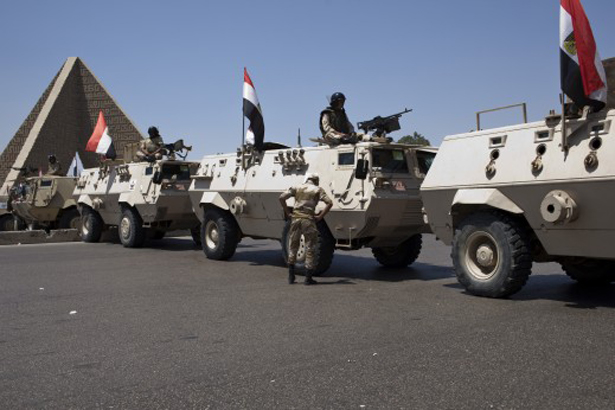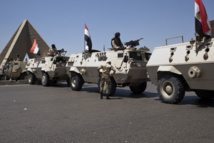Two people including a woman were wounded in the blast which tore the victim's body to pieces, a health ministry official said.
Police said the device exploded as a minivan driver stopped to ask the policeman a question, probably for directions.
Militants have repeatedly targeted police checkpoints and vehicles in Cairo with bombs.
Sunday's attack was claimed by jihadist group Ajnad Misr (Soldiers of Egypt), which has previously admitted being behind similar attacks on security forces in the city.
"Once again Allah allowed our brave soldiers to plant a bomb targeting an assembly of the criminal forces," Ajnad Misr said on its Twitter account.
Hours later, the interior ministry said security forces had killed Ajnad Misr chief Hammam Mohamed Attiyah in a shootout during a raid on an apartment in south Cairo's Giza district.
No date was given for his reported death, and there was no immediate confirmation from the militants.
Interior Ministry spokesman General Hani Abdel Latif, describing Attiyah as a "fugitive terrorist", said he had been "plotting and preparing to carry out criminal plans".
Ajnad Misr "is accused of carrying out 26" attacks on police, mainly in Cairo, that have killed several people, he said in a statement.
The group says its attacks are in retaliation for the deaths of hundreds of Islamist protesters killed in a government crackdown since the ouster of president Mohamed Morsi in July 2013.
Ajnad Misr has claimed responsibility for bombings outside the presidential palace and foreign ministry that last year killed four policemen, two of them explosives experts.
- Civilian casualties -
The jihadist group has said it deliberately uses low-yield bombs to avoid harming passers-by, but there has also been a rise in civilian casualties.
A bombing outside Cairo University last month wounded four civilians and four policemen.
Morsi's Muslim Brotherhood, the strongest political movement before his overthrow, has been designated a terrorist group despite saying it rejects violence.
However, some Brotherhood members are believed to have resorted to plotting attacks on policemen after the crackdown drove them underground.
Sunday's interior ministry statement said Attiyah had been in the jihadist Ansar Beit al-Maqdis -- now affiliated with the Islamic State group (IS) -- but broke away in 2013 to found Ajnad Misr.
Ansar Beit al-Maqdis -- Partisans of Jerusalem in English -- is Egypt's deadliest militant group.
It is based in the restive Sinai Peninsula, where it has killed scores of security personnel, including at least 15 soldiers in coordinated attacks on Thursday.
The group changed its name last year to Sinai Province after pledging allegiance to IS, which controls large areas of Iraq and Syria.
Egypt's military says it has killed a number of jihadists in Sinai, and on Sunday released footage of bodies of suspected militants.
Abdel Fattah al-Sisi, the former army chief who toppled Morsi and later won a presidential election, has staked his leadership on eradicating militant groups.
Attacks have dwindled in the past year as the government tries to attract investment and tourism.
But the latest attacks have shown militants can still operate despite the crackdown and harsh verdicts against those convicted.
Civilian and military courts have sentenced dozens of people to death, although only one execution has been carried out so far, by hanging.
Morsi himself could face the gallows if convicted in one of his trials on charges of espionage with foreign powers and collusion to carry out attacks with militants before he became the country's first democratically elected president in 2012.
---------------------------------------------------------------------------------------------------
Police said the device exploded as a minivan driver stopped to ask the policeman a question, probably for directions.
Militants have repeatedly targeted police checkpoints and vehicles in Cairo with bombs.
Sunday's attack was claimed by jihadist group Ajnad Misr (Soldiers of Egypt), which has previously admitted being behind similar attacks on security forces in the city.
"Once again Allah allowed our brave soldiers to plant a bomb targeting an assembly of the criminal forces," Ajnad Misr said on its Twitter account.
Hours later, the interior ministry said security forces had killed Ajnad Misr chief Hammam Mohamed Attiyah in a shootout during a raid on an apartment in south Cairo's Giza district.
No date was given for his reported death, and there was no immediate confirmation from the militants.
Interior Ministry spokesman General Hani Abdel Latif, describing Attiyah as a "fugitive terrorist", said he had been "plotting and preparing to carry out criminal plans".
Ajnad Misr "is accused of carrying out 26" attacks on police, mainly in Cairo, that have killed several people, he said in a statement.
The group says its attacks are in retaliation for the deaths of hundreds of Islamist protesters killed in a government crackdown since the ouster of president Mohamed Morsi in July 2013.
Ajnad Misr has claimed responsibility for bombings outside the presidential palace and foreign ministry that last year killed four policemen, two of them explosives experts.
- Civilian casualties -
The jihadist group has said it deliberately uses low-yield bombs to avoid harming passers-by, but there has also been a rise in civilian casualties.
A bombing outside Cairo University last month wounded four civilians and four policemen.
Morsi's Muslim Brotherhood, the strongest political movement before his overthrow, has been designated a terrorist group despite saying it rejects violence.
However, some Brotherhood members are believed to have resorted to plotting attacks on policemen after the crackdown drove them underground.
Sunday's interior ministry statement said Attiyah had been in the jihadist Ansar Beit al-Maqdis -- now affiliated with the Islamic State group (IS) -- but broke away in 2013 to found Ajnad Misr.
Ansar Beit al-Maqdis -- Partisans of Jerusalem in English -- is Egypt's deadliest militant group.
It is based in the restive Sinai Peninsula, where it has killed scores of security personnel, including at least 15 soldiers in coordinated attacks on Thursday.
The group changed its name last year to Sinai Province after pledging allegiance to IS, which controls large areas of Iraq and Syria.
Egypt's military says it has killed a number of jihadists in Sinai, and on Sunday released footage of bodies of suspected militants.
Abdel Fattah al-Sisi, the former army chief who toppled Morsi and later won a presidential election, has staked his leadership on eradicating militant groups.
Attacks have dwindled in the past year as the government tries to attract investment and tourism.
But the latest attacks have shown militants can still operate despite the crackdown and harsh verdicts against those convicted.
Civilian and military courts have sentenced dozens of people to death, although only one execution has been carried out so far, by hanging.
Morsi himself could face the gallows if convicted in one of his trials on charges of espionage with foreign powers and collusion to carry out attacks with militants before he became the country's first democratically elected president in 2012.
---------------------------------------------------------------------------------------------------









 Home
Home Politics
Politics











